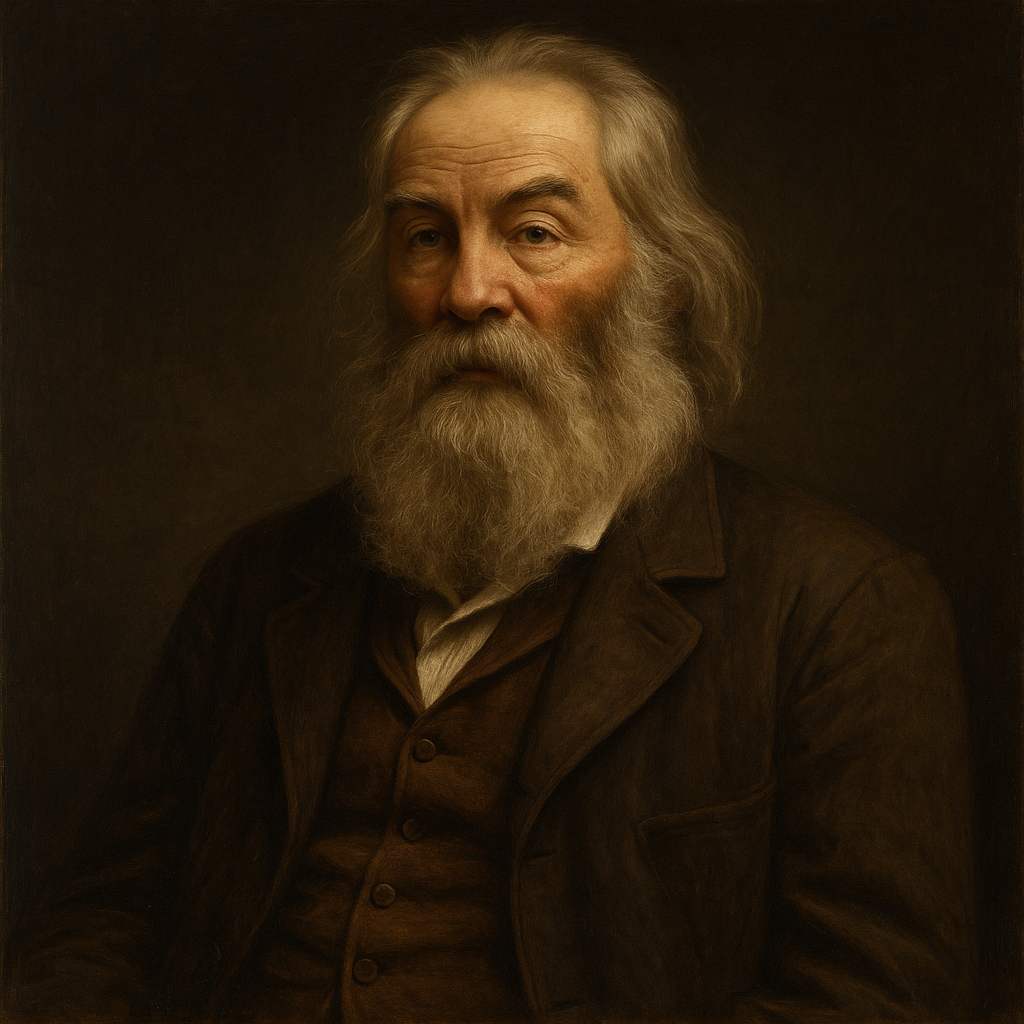Song of Myself
Walt Whitman
1819 to 1892

I celebrate myself, and sing myself,
And what I assume you shall assume,
For every atom belonging to me as good belongs to you.
I loafe and invite my soul,
I lean and loafe at my ease observing a spear of summer grass.
My tongue, every atom of my blood, form’d from this soil, this air,
Born here of parents born here from parents the same, and their parents the same,
I, now thirty-seven years old in perfect health begin,
Hoping to cease not till death.
Walt Whitman's Song of Myself
Walt Whitman's "Song of Myself," particularly its opening lines, stands as a seminal work in American poetry, encapsulating the essence of Transcendentalism and setting the stage for a new, distinctly American poetic voice. This analysis will explore the themes, style, and significance of these introductory lines, which serve as a powerful declaration of the poet's intent and worldview.
The poem opens with a bold statement of self-celebration: "I celebrate myself, and sing myself." This line immediately establishes the central theme of individualism, a cornerstone of Transcendentalist philosophy. Whitman's use of the first person and the repetition of "myself" emphasizes the importance of the individual experience. However, this is not a selfish or isolating individualism; rather, it's an expansive one that seeks to connect with the universal.
This connection is evident in the following lines: "And what I assume you shall assume, / For every atom belonging to me as good belongs to you." Here, Whitman bridges the gap between the self and the other, suggesting a fundamental unity of all beings. The use of scientific language ("atom") reflects the poet's engagement with the emerging scientific understanding of his time, while also serving as a metaphor for the smallest unit of existence. This creates a powerful image of shared essence at the most fundamental level.
The poem then shifts to a more relaxed tone: "I loafe and invite my soul, / I lean and loafe at my ease observing a spear of summer grass." The repetition of "loafe" (an archaic spelling of "loaf") emphasizes the poet's leisurely state, which is not mere idleness but a conscious choice to be present and observant. The "spear of summer grass" becomes a focal point for meditation, a seemingly insignificant natural object that contains within it the mysteries of the universe - a common Transcendentalist trope.
Whitman then grounds himself firmly in the physical world: "My tongue, every atom of my blood, form'd from this soil, this air." This line emphasizes the poet's connection to the natural world, suggesting that he is not separate from nature but a product of it. The mention of "tongue" is particularly significant, as it links the poet's physical being with his role as a speaker and singer of verse.
The poet goes on to establish his lineage: "Born here of parents born here from parents the same, and their parents the same." This line not only roots Whitman in a specific place and tradition but also suggests a timeless continuity. It's worth noting that this American lineage is presented without reference to European ancestors, asserting a distinctly American identity.
The final lines of this extract introduce a temporal element: "I, now thirty-seven years old in perfect health begin, / Hoping to cease not till death." Whitman presents himself at a specific moment in time, in the prime of life, embarking on a poetic journey that he intends to continue for the rest of his days. The mention of "perfect health" underscores the vitality and optimism that permeate the poem.
Stylistically, these lines are characteristic of Whitman's revolutionary approach to poetry. The free verse form, with its long lines and lack of regular rhyme or meter, breaks from traditional poetic conventions. This formal freedom mirrors the thematic freedom of the poem, allowing Whitman to express his expansive vision without the constraints of traditional forms.
The language is direct and unadorned, yet charged with significance. Whitman's use of repetition ("myself," "loafe," "born here") creates a rhythmic quality that compensates for the lack of formal meter. The mix of the colloquial ("loafe") with the elevated ("every atom of my blood") creates a democratic diction that reflects Whitman's egalitarian philosophy.
In conclusion, these opening lines of "Song of Myself" serve as a powerful introduction to Whitman's poetic project. They establish the major themes of the work - individualism, universality, the connection between self and nature, and the celebration of the American experience. Moreover, they introduce Whitman's distinctive voice and style, which would go on to influence generations of poets. Through these lines, Whitman not only celebrates himself but also invites the reader to join in this celebration, setting the stage for a poem that seeks to encompass nothing less than the entirety of American experience.
This text was generated by AI and is for reference only. Learn more
Want to join the discussion? Reopen or create a unique username to comment. No personal details required!



Comments
No comments yet. Be the first to comment!